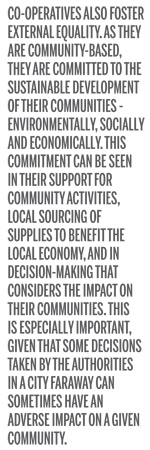
 For those who have grown up in a village, going to the village Multi-Purpose Cooperative Society (MPCS) was part and parcel of life. Apart from the temple, it was the other focal point of the village, where the entire village came together in a spirit of brotherhood. Although cooperative stores in Sri Lanka have lost their lustre somewhat with the rise of the supermarket chains, they still engage in many other businesses from banking to fuel sales. Cooperatives can also be called the most localised adminustrative structure and representatives are elected by the ballot.
For those who have grown up in a village, going to the village Multi-Purpose Cooperative Society (MPCS) was part and parcel of life. Apart from the temple, it was the other focal point of the village, where the entire village came together in a spirit of brotherhood. Although cooperative stores in Sri Lanka have lost their lustre somewhat with the rise of the supermarket chains, they still engage in many other businesses from banking to fuel sales. Cooperatives can also be called the most localised adminustrative structure and representatives are elected by the ballot.
The earliest record of a Co-operative comes from Scotland - March 14, 1761. But it took a few more decades for Co-operatives to be recognised as a formal movement. In 1844, a group of 28 artisans working in the cotton mills in north of England established the first modern Co-operative business. Today, more than 12 percent of humanity is part of any of the three million Co-operatives in the world. The largest 300 Co-operatives report a total turnover of US$ 2,034.98 billion per annum. Co-operatives employ 280 million people across the globe (10 percent of the world’s employed population).
 On July 2, (yesterday) Co-operatives all around the world celebrated the 100th International Day of Cooperatives (#CoopsDay). A decade on from the UN International Year of Cooperatives, which showcased the unique contribution of cooperatives to making the world a better place, this year’s #CoopsDay slogan — “Cooperatives Build a Better World”— echoes the theme of the International Year. Cooperatives aim to do this via Voluntary and Open Membership; Democratic Member Control; Member Economic Participation; Autonomy and Independence; Education, Training, and Information; Enhanced cooperation among Cooperatives and concern for the local community.
On July 2, (yesterday) Co-operatives all around the world celebrated the 100th International Day of Cooperatives (#CoopsDay). A decade on from the UN International Year of Cooperatives, which showcased the unique contribution of cooperatives to making the world a better place, this year’s #CoopsDay slogan — “Cooperatives Build a Better World”— echoes the theme of the International Year. Cooperatives aim to do this via Voluntary and Open Membership; Democratic Member Control; Member Economic Participation; Autonomy and Independence; Education, Training, and Information; Enhanced cooperation among Cooperatives and concern for the local community.
Ideal opportunity
Operating all around the world, in many different sectors of economy, Co-operatives have proven themselves more resilient to various crises than the average. Indeed, in the face of the current socio-economic crisis faced by Sri Lanka, Co-operatives can and should do more to alleviate the suffering of the people. This should be an ideal opportunity to expand the operations and scope of the Co-operatives movement which has a rich history in the country. It is a people’s movement that can withstand any challenge and emerge stronger and more people will no doubt rally round it if it can help resolve the current economic imbroglio to some extent. For example, it could sell rice at lower prices than at other private traders in a manner that still benefits both the farmer and the consumer.

On a global scale, they foster economic participation, fight against environmental degradation and Climate Change, generate good jobs, contribute to food security, keep financial capital within local communities, build ethical value chains, and, by improving people’s material conditions and security, contribute to positive peace in the community.
Co-operatives have been acknowledged as associations and enterprises through which citizens can effectively improve their lives while contributing to the economic, social, cultural and political advancement of their community and nation. The co-operative movement has been also recognized as a distinct and major stakeholder in both national and international affairs.
Co-operatives’ open membership model affords access to wealth creation and poverty elimination. This results from the co-operative principle of members’ economic participation: ‘Members contribute equitably to, and democratically control, the capital of their Co-operative.’ Because co-operatives are people-centred, not capital-centred , they do not perpetuate, nor accelerate capital concentration and they distribute wealth in a more fair way. Indeed, anyone can become a member of the nearest co-operative and even become an official through elections that are held regularly.
Co-operatives also foster external equality. As they are community-based, they are committed to the sustainable development of their communities - environmentally, socially and economically. This commitment can be seen in their support for community activities, local sourcing of supplies to benefit the local economy, and in decision-making that considers the impact on their communities. This is especially important, given that some decisions taken by the authorities in a city faraway can sometimes have an adverse impact on a given community. On the other hand, the co-operative members know the needs of their own communities and can tailor programs that suit those specific needs. This is why co-operatives can act fast in emergencies and other such situations faster than Government mechanisms.
 Social and environmental objectives, Despite their local community focus, Co-operatives also aspire to bring the benefits of their economic and social model to all people in the world, being a global movement. Globalization should be governed by a set of values such as those of the co-operative movement; otherwise, it creates more inequality and excesses that render it unsustainable.
Social and environmental objectives, Despite their local community focus, Co-operatives also aspire to bring the benefits of their economic and social model to all people in the world, being a global movement. Globalization should be governed by a set of values such as those of the co-operative movement; otherwise, it creates more inequality and excesses that render it unsustainable.
In this respect, the Co-operative movement is highly democratic, locally autonomous, but internationally integrated, and a form of organisation of associations and enterprises whereby citizens themselves rely on self-help and their own responsibility to meet goals that include not only economic, but also social and environmental objectives, such as overcoming poverty, securing productive employment and encouraging social integration.
The International Co-operative Alliance (ICA) unites, represents and serves cooperatives worldwide. Founded in 1895, it is one of the oldest Non-Governmental organisations and one of the largest ones measured by the number of people represented: 1,2 billion cooperative members on the planet. The Alliance works with global and regional Governments and Organizations to create the legislative environments that allow cooperatives to form and grow. Sri Lankan co-operatives are actively involved in the operations of the ICA.
Sri Lanka’s situation
Sri Lanka’s Co-operative sector should be revamped in the face of the multitude of challenges facing the nation. For example, there should be more MPCS-owned filling stations, so that the local community itself can monitor the distribution of fuel once fuel operations return to normality. Co-operative banking (Sanasa) too should be similarly improved, with more branches in more rural and urban communities. Its model of rolling credit actually precedes the concept of Grameen, popularised throughout the world by the Nobel Prize winning Muhammed Yunus of Bangladesh. The co-operative model, though not a one-size fits all solution to our current woes, can make a discernible difference.
